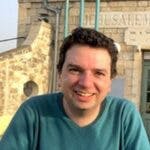Published: 2 June 2023
Last updated: 5 March 2024
Ahead of her Australian appearance, storyteller NOA BAUM spoke with ITTAY FLESCHER about how stories that divide Israelis and Palestinians can create a path to change reality.
It’s hard to open a newspaper in Australia today and not feel that the people are divided. From transgender rights to racism in the AFL; online hatred against journalists and politicians to the ever-growing toxicity surrounding the Indigenous Voice referendum.
At a time when it seems hard for different people to be in the same room, let alone being open to hearing each other's stories, internationally acclaimed author and storyteller Noa Baum is heading to Australia, with a unique perspective on the power of personal narratives to open hearts and minds.
Baum's memoir, A Land Twice Promised: An Israeli Woman’s Quest for Peace, tells the story of her childhood in Jerusalem where she experienced the Six-Day War in a bomb shelter. She later graduated from the respected Leyada (Hebrew University) high school. Growing up with ancestral Holocaust trauma and ongoing terrorism of the Arab-Israeli conflict greatly shaped her perceptions and identity, like it does for all Israelis.
After moving to North America in 1990, she encountered another parent in a park that would change the way she saw the world and understood the Zionist story in which she had been raised.
Jumana (not her real name) also grew up in Jerusalem. But it may have been another planet given how little those from the eastern and western parts of the city know about each other. Baum and Jumana both gave birth to baby boys - Ittay and Tamer - six months apart. Seven years after first forming a friendship through a mothers group, Baum and Jumana started talking about the taboos from their childhoods. For Baum, it was her first Palestinian friend.
In a TED Talk called “Beyond Labels”, Baum shared how when they first met, she asked Jumana lots of questions about her school, home and family, and the stories came pouring out. “For the first time in my life I heard what it actually feels like to be a Palestinian growing up under Israeli occupation,” she said.
Jumana told Baum that when she was 10, she saw a 14-year-old boy being beaten by soldiers and for the first time she understood the meaning of hate.
“Hearing this felt like someone just kicked me in the gut because those soldiers that terrified and haunted her entire childhood were our symbol of security, our heroes. Everyone that I knew that turned eighteen went to the army, including my brother. My people were the “them”. It was painful but I kept listening because she was telling me her story, and eventually we began to talk about history.”
Baum relates how she said something that was a historical fact to Jumana, who responded, “That's not true, that’s Zionist propaganda”. Then Jumana said something that was a historical fact and Baum replied, “That's Arab propaganda”.
As they began arguing, Jumana said, “Look at us, we're becoming defensive”. They both laughed as Baum held Jumana’s baby so she could make food for the other kids. They continued to talk, letting this experience open them both up to the possibility of compassion despite their many differences.
Since the beginning of time, the art of storytelling has given people an understanding that we are connected in our humanity.
Baum believes that personal stories are the key that can overcome our gut instincts to defend the status quo. The default response of many Jews to Palestinian stories is so often categorised as “hasbara” (taking the government line). Similarly, the default response of many Palestinians to Zionism is to frame it as colonialism and apartheid. Though the process can be painful, Baum believes we need to build “safe containers” and trusted spaces for stories to be told and heard.
The great Jerusalem philosopher Martin Buber famously wished for all humans to have less “I-It” conversations where they see each other as objects, and more “I-Thou” conversations where both parties become open to being changed by one another. Baum adopts this principle, believing that storytelling is the best path to coexistence in the Middle East, and every other world conflict, because the “us or them” alternative is so much worse.
“Since the beginning of time, the art of storytelling has given people an understanding that we are connected in our humanity. When I hear stories, my heart opens, I have more understanding and tolerance, so I don’t resent and hate those different me, but I do understand where they are coming from. This change doesn’t happen instantly, and it doesn’t come from debate. It takes time to build trust and once we allow stories to be heard and told it creates the possibility for change - which creates hope.”
Unlike those who are sure that uncompromising strength and violence are essential to end the war, Baum says building relationships premised on honour and validation would help Israelis and Palestinians end the cycle of violence that causes both so much suffering.
Whether ending one of the world’s longest running conflicts or whether negotiating with a toddler who can’t take “no” for an answer, Baum says the power of validation, of honouring the other’s feelings before jumping into rebuttals and reasoning, is the most important tool we have as humans to live together in peace.
Noa Baum will be speaking at the Sydney Jewish Writers Festival on 7 June.
Photo: Noa Baum (Courtesy of noabaum.com)



